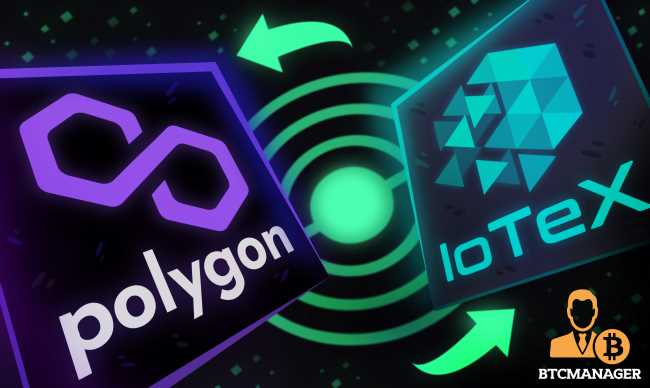IoTeX (IOTX), has announced the completion of its cross-chain bridge to Polygon (MATIC). Dubbed ioTube v4, the team says the cross-chain bridge now supports two-way token swaps between IoTeX and Polygon, Ethereum, and Binance Smart Chain (BSC).
IoTeX Multi Chain Bridge Now Live
Building upon its partnership with Polygon (MATIC), IoTeX, a distributed ledger technology (DLT) project that claims to be focused on building the Internet of Trusted Things – an ecosystem where humans, machines, businesses, and decentralized applications (dApps) can interact with total trust and privacy, has added support for Polygon (MATIC) in its cross-chain bridge.
As earlier reported by BTCManager, IoTeX launched the ioTube v4 cross-chain bridge in April 2021, allowing users to carry out a secure and frictionless bi-directional exchange of a vast array of crypto assets between IoTeX, Ethereum, and Binance Smart Chain (BSC).
Fast forward to June 11 and the IoTex team has added support for Polygon (MATIC) on ioTube v4, making it possible for members of both ecosystems to carry out seamless token swaps between the two networks with ultra-low fees.
For starters, IoTeX v4 will support only a handful of Polygon tokens, including MATIC, wMATIC (wrapped), wETH, wBTC, DAI, USDT, USDC, SUSHI, QUICK, and AAVE. However, the team has made it clear that more tokens will be added to the list shortly.
To start enjoying cost-efficient and superfast token swapping on the IoTeX network, just download the Mobile or Desktop version of the ioPay application, and follow the comprehensive step-by-step guide for Polygon-IoTeX, Ethereum-IoTex, BSC-IoTeX on the ioTube website.
The ioTube v4 Architecture
Notably, the team says ioTube v4 uses multiple smart contracts on both the origin and destination blockchains to facilitate cross-chain token swaps. Explaining the workings of ioTubev4, the team wrote:
“When a user deposits assets into a cashier contract on Chain A, which is an event that is observed by multiple witness nodes. The witness nodes verify this event and send a signature to the realtor network, which aggregates all signatures and instructs a validator contract on Chain B to mint the same amount of tokens that were deposited on Chain A.”
Specifically, the ioTube v4 architecture comes with seven major contracts, including WitnessList, TokenList, TokenSafe, MinterPool, TokenCashier, and TransferValidator.
The WitnessList smart contract keeps a record of the active witnesses, TokenSafe stores the tokens deposited to the token cashier before passing them to the transfer validator which in turn sends the tokens to the rightful recipients.
The TokenList contract stores the list of whitelisted tokens, the MinterPool’s primary function is to hold the minter authorities of all mintable tokens, while the TokenCashier contract accepts all crypto assets deposits and issues a receipt for each successful deposit.
Founded as an open-source distributed ledger in 2017, IoTeX is backed by a global team of more than 30 research scientists and engineers.
“IoTeX combines blockchain, secure hardware, and confidential computing to enable next-gen IoT devices, networks, and economies. IoTeX will empower the future decentralized economy by connecting the physical world, block by block,” the team declared.
At press time, the price of IoTeX (IOTX) is hovering around $0.02467, with a market cap of $236.28 million, as seen on CoinMarketCap.
Related posts:
Source: Read Full Article
